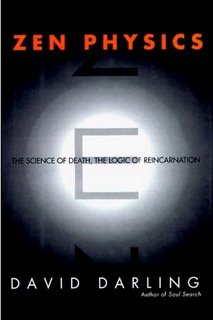But there can be sadness. You have "lost" a loved one…your old persona. There can be periods of grief the more the old you fades away. An intriguing meditation: Think of Cinemorphic change as death and reincarnation.
To take this one step further, check out ZEN PHYSICS by David Darling. Here's a description of the book from Publishers Weekly:

"With the catapult of logic, astrophysicist Darling (Equations of Eternity) lobs a barrage of scientific data against death's door. But he-and we-never quite gain access to the ultimate mystery. The title notwithstanding, Darling's prime ammo is psychology, not physics, and Zen enters his plan only in the endgame. His main thrust involves presenting cases of amnesia, multiple personality disorder and other afflictions, as well as facts of the brain-mind connection, to demonstrate that our sense of self is not steady, as is generally supposed, but fluid, even temporally discrete. Darling then announces a not quite convincing and emotionally unsatisfying theory of "reincarnation" based on this ever-changing self, in which successive incarnations of "me" retain no personal link from one to the next. With great elegance, he next uses findings of quantum physics to show that consciousness is primary to matter. This contradicts Western scientific orthodoxy, but Darling makes a strong case. Both the fluid self and the primacy of matter accord with Buddhist principles, which is where Zen comes in. Oddly, though, Darling's idea of reincarnation seems to veer from Zen basics, as it eliminates the possibility of conscious reincarnation. Likely, readers will finish this bold brief sensing they've peeked through death's keyhole, but have not opened the door."
